As an enthusiast of the natural world, Ive always been fascinated by the intricate web of life that connects all living things. Recently, I had the opportunity to delve deeper into the crucial role animals play in maintaining the delicate balance of ecosystems.
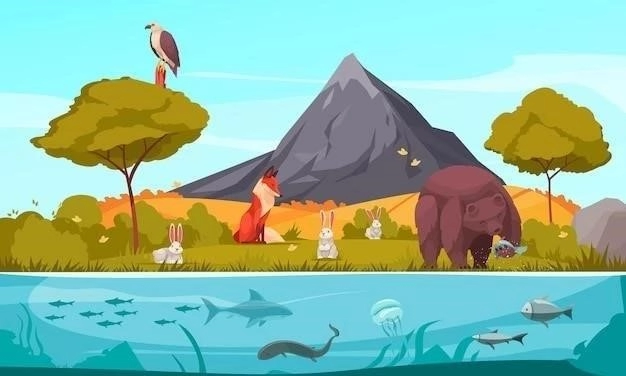
My Exploration of a Local Ecosystem
To truly appreciate the impact of animals, I decided to visit a nearby forest. Armed with my binoculars and notebook, I ventured into the woods, eager to observe the ecosystem in action.
One of the first things I noticed was the abundance of insects. Bees buzzed from flower to flower, their furry bodies coated in pollen. I watched as a hummingbird, with its iridescent feathers, hovered near a trumpet vine, its long beak perfectly adapted for sipping nectar. These creatures, I realized, were essential for pollination, ensuring the continuation of plant life in the forest.
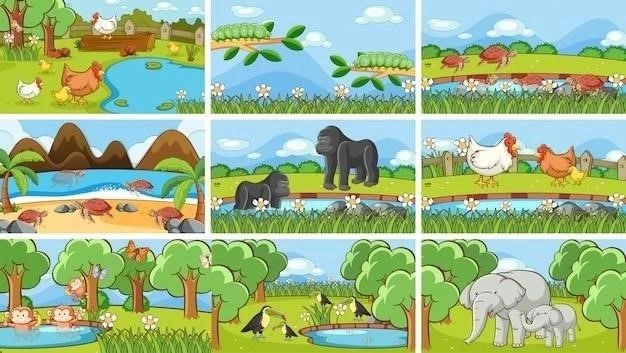
The Impact of Herbivores
As I walked deeper into the woods, I came across a herd of deer grazing peacefully in a sun-dappled clearing. Their presence reminded me of the role herbivores play in shaping ecosystems. By consuming plants, they help control vegetation growth and prevent any one species from dominating the landscape.
The Circle of Life⁚ Predators and Scavengers
Later, I noticed signs of a predator ⎻ tracks in the mud and scattered feathers. While I didnt encounter any predators directly, their presence was evident. Predators, like foxes and owls, help regulate prey populations, ensuring the health of the ecosystem.
On my way back, I encountered a flock of crows noisily feasting on the remains of a fallen animal. While it wasnt the most pleasant sight, it served as a reminder of the important role scavengers play in breaking down organic matter and recycling nutrients back into the ecosystem.
My Realization
My trip to the forest solidified my understanding of the interconnectedness of all living things. Animals, from the tiniest insects to the largest mammals, play vital roles in maintaining the health and balance of ecosystems.
Key Takeaways⁚
- Pollination⁚ Many animals, like bees, butterflies, and birds, are essential for pollinating plants, which is crucial for the survival of countless plant species.
- Seed Dispersal⁚ Animals aid in seed dispersal by consuming fruits and then depositing seeds in different locations through their droppings, helping plants colonize new areas;
- Population Control⁚ Predators keep prey populations in check, preventing overgrazing and maintaining a balance within the ecosystem.
- Nutrient Cycling⁚ Scavengers and decomposers break down dead organisms and waste, returning essential nutrients to the soil, which can then be used by plants.
My experience highlighted the importance of protecting animals and their habitats. Loss of biodiversity can disrupt these delicate ecosystems, with far-reaching consequences for all living things, including humans.
As I left the forest, I found myself reflecting on the interconnectedness I had witnessed. It wasnt just about the animals I had seen, but also the ones I hadnt – the earthworms aerating the soil beneath my feet, the countless microorganisms breaking down fallen leaves into fertile compost. It made me think about my own role in this delicate balance.
Inspired, I decided to take action. I started composting my food scraps, creating a mini-ecosystem in my own backyard. I planted wildflowers known to attract pollinators, hoping to provide a small haven for bees and butterflies. I even started paying closer attention to the products I bought, trying to support companies committed to sustainable practices that minimize their impact on wildlife.
One weekend, I volunteered with a local conservation group. We spent the day removing invasive plant species from a nearby park, learning about how these plants outcompete native ones and disrupt the delicate balance of the ecosystem. It was tiring work, but incredibly rewarding to know that I was playing a part in protecting the habitat for native animals.
My journey into the world of ecosystems didnt stop there. I began reading books and articles about different habitats around the world, from the coral reefs teeming with life to the vast savannas of Africa. Each ecosystem, I learned, has its own unique set of animals, plants, and environmental factors, all intricately connected.
My experiences have given me a profound appreciation for the natural world and the role animals play within it. Its an ongoing journey of discovery, and Im committed to learning more and doing my part to protect these precious ecosystems for generations to come.
Inspired by my newfound knowledge, I decided to turn my small apartment balcony into a mini-ecosystem. I already had a few potted herbs, but I wanted to create something more diverse, something that would attract pollinators and maybe even provide a meal or two for some lucky birds.
I visited a local nursery, eager to find plants native to my region. The owner, a kind woman named Susan, helped me choose a variety of flowering plants that would bloom at different times, providing a continuous source of nectar for pollinators. I selected vibrant purple coneflowers, delicate pink bee balm, and sunny yellow black-eyed Susans. Susan also suggested I plant some herbs that attract beneficial insects, like dill and parsley. I left the nursery with my car overflowing with plants, eager to get started.
Back home, I carefully arranged the plants on my balcony, ensuring they received plenty of sunlight. I added a bird feeder filled with sunflower seeds and a shallow dish of water for birds and insects to drink from. It wasnt much, but it was a start.
Over the next few weeks, I eagerly watched my mini-ecosystem come to life. Tiny butterflies with wings like stained glass flitted between the blooms, their delicate legs dusted with pollen. Bumblebees, their fuzzy bodies vibrating, burrowed deep inside the blossoms, emerging covered in golden dust. One morning, I even spotted a hummingbird, its iridescent throat shimmering as it sipped nectar from the bee balm.
My balcony had become a haven for these creatures, a small pocket of life amidst the concrete jungle of the city. It wasnt just the animals that benefited. Tending to my plants, watching the bees buzz, and listening to the birds sing brought me a sense of peace and connection I hadnt realized I was missing. It was a reminder that even in the most urban of environments, we can still find ways to connect with nature and play a part in protecting the delicate balance of our planet.
Inspired by my thriving balcony ecosystem, I decided to take my conservation efforts a step further. I had always loved hiking, but now I saw the trails with new eyes, noticing the intricate relationships between the plants, animals, and the environment. One crisp autumn afternoon, I found myself drawn to a local park known for its diverse bird population.
Armed with a pair of binoculars and a field guide, I set off on a trail that meandered through a mix of woodlands and meadows. As I walked, I paid close attention to the sounds around me⁚ the rustling of leaves, the chirping of crickets, the distant drumming of a woodpecker. I spotted a flash of blue and quickly raised my binoculars, catching a glimpse of an indigo bunting perched on a branch, its vibrant plumage a stark contrast against the autumn foliage.
Further down the trail, I came across a group of people huddled together, their binoculars all pointed towards the top of a tall oak tree. Curious, I approached and asked what they were looking at. “A great horned owl,” whispered a woman, her voice filled with excitement. She pointed to a spot high in the tree, and there it was⁚ a magnificent owl, its feathered ear tufts erect, its piercing yellow eyes scanning the ground below.
We stood there for a while, captivated by the sight of this apex predator. I learned that great horned owls play a vital role in controlling rodent populations, which in turn helps to maintain the health of the forest ecosystem. It was a powerful reminder of the interconnectedness of all living things, even in a seemingly ordinary park.
As the sun began to set, I started making my way back, feeling a renewed sense of wonder and responsibility. I had always appreciated natures beauty, but now I understood its complexity and fragility on a deeper level; It was a responsibility I didnt take lightly.
From that day forward, I made a conscious effort to learn more about the ecosystems in my area. I attended workshops on native plant gardening, volunteered with local conservation groups to restore degraded habitats, and even started advocating for policies that protect wildlife and their homes. It wasnt always easy, and there were times when I felt overwhelmed by the sheer scale of the challenges facing our planet. But then I would remember the vibrant life on my balcony, the majestic owl in the park, and I would feel a surge of hope.
Every small action, I realized, every seed planted, every piece of trash picked up, every voice raised in defense of nature, makes a difference. Its a collective effort, a tapestry woven from countless individual threads, all working together to create a healthier, more sustainable future for ourselves and for all living things.

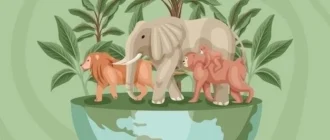

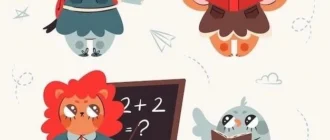
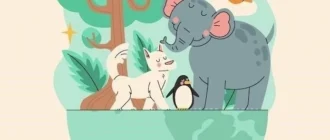
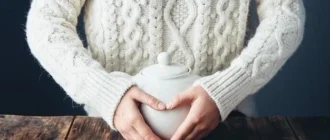
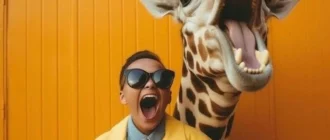
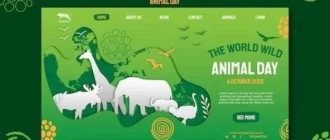
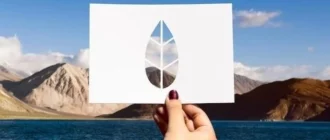
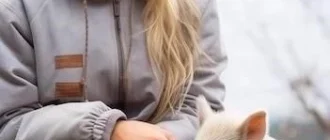
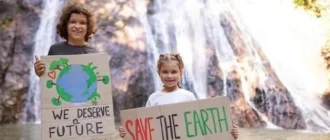
This article inspired me to learn more about the animals in my local area. I had no idea there was so much to discover!
I appreciate your focus on the positive aspects of animals\
I found your observations about the predator signs to be particularly interesting. It\
Your article is a great reminder of the wonders of the natural world and the importance of preserving it for future generations.
I enjoyed reading about your personal experience in the forest. It made the information more relatable and engaging.
Your description of the deer grazing reminded me of a time I went hiking and stumbled upon a herd of elk. They were so majestic! It was a powerful reminder of the beauty and importance of herbivores in the wild.
Your article is a great resource for anyone looking to learn more about the natural world.
I appreciate the balanced perspective you provide on the roles of different animals in the ecosystem.
Your article reminded me of the importance of protecting natural habitats. We need to do everything we can to preserve these delicate ecosystems.
The part about predators and scavengers is so important. It\
Your article is well-written and informative. I learned a lot about the importance of animals in maintaining ecosystem balance.
I enjoyed reading about your personal connection to nature. It shines through in your writing.
I love how you connected your observations to the bigger picture of ecosystem health. It\
Your writing is so vivid! I felt like I was right there with you in the forest, experiencing the wonders of nature firsthand.
I appreciate you highlighting the importance of insects. They often get overlooked, but they\
Your article is a testament to the power of observation and the importance of appreciating the natural world around us.
Your article is both educational and inspiring. Thank you for sharing your insights.
I had a similar experience visiting a local park! I was amazed by how many different types of birds there were and how each one seemed to have its own niche in the ecosystem. It really made me appreciate the complexity of nature.
I found your observations about the interconnectedness of all living things to be particularly insightful.
Your writing style is engaging and informative. I learned a lot from reading your article.